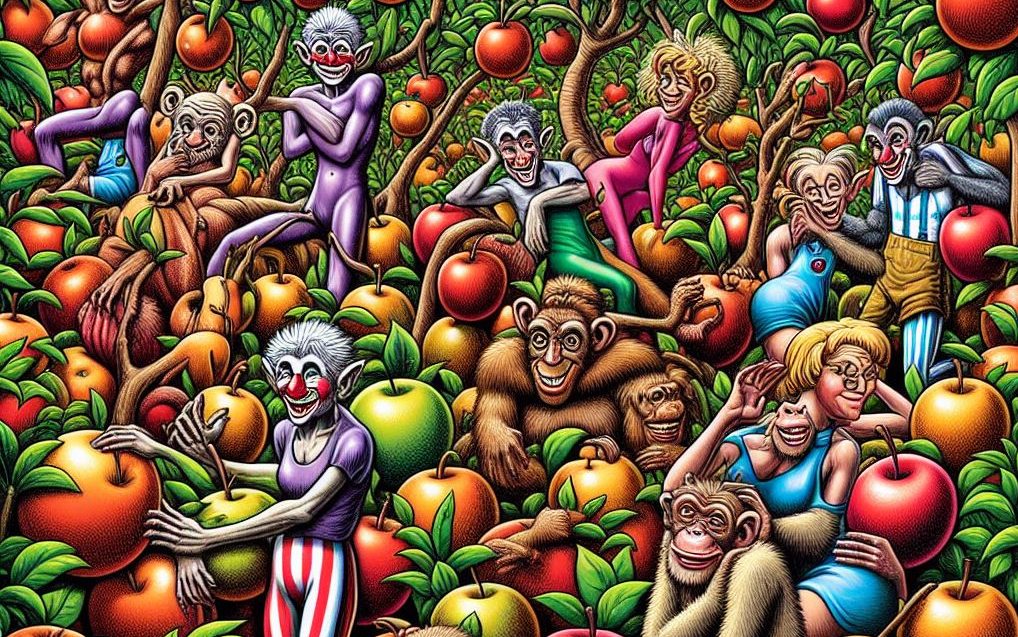
Orchards Farmer Cowboy 14.jpg
Orchard Ordeals: The Hilarious Highs and Lows of Growing Fruit!
Space your trees adequately to prevent a fruit jungle.
Apple Valley, USA – In the picturesque Apple Valley, USA, the art of orchard management has become a comedy of errors and triumphs. As local farmers attempt to perfect their fruit-growing techniques, their stories offer a blend of humor, unexpected challenges, and sweet successes.
Apple Antics
Jeff Walters, inspired by his grandmother’s famous applesauce, mistakenly used Granny Smith apples, only to discover they were not the best choice for sauce-making. “Granny Smith apples are for eating, not for making sauce,” says Dr. Orchard, a renowned fruit specialist. Jeff’s confusion led to a batch of tart and crunchy applesauce that became the talk of the town.
Bee Battles
During pollination season, Jeff’s well-intentioned efforts to help pollinate the orchard resulted in accidentally angering the local bee population. “I danced around like I was at a rave,” laughs Farmer Bob, recalling the impromptu dance party that ensued. Despite the chaos, the bees eventually forgave him, and pollination proceeded as planned.
Pruning Problems
Jeff’s overzealous pruning efforts turned his apple trees into bonsai plants. “My trees look like they belong in a Japanese garden,” jokes Farmer Sally. While pruning is essential for healthy growth, Jeff’s artistic approach led to some interesting, albeit unproductive, tree shapes.
Overzealous pruning turns apple trees into bonsai plants.
Fruit Fashion
In an effort to protect his fruit from pests, Jeff dressed his apples in protective bags, inadvertently creating the latest orchard fashion statement. “80% of farmers use protective bags to avoid pests,” reports the Orchard Institute. The sight of bagged apples swaying in the breeze added a whimsical touch to the orchard.
Deer Dilemmas
Installing scarecrows to deter deer resulted in props that scared the farmers more than the deer. “Those scarecrows are more like horror movie props,” says Farmer Tom. The eerie figures failed to frighten the deer but provided endless entertainment for the local children.
Fertilizer Fun
A mix-up between organic fertilizer and store-bought compost led to a nutrient overload, producing apples the size of pumpkins. “My apples grew to the size of pumpkins,” notes Farmer Ed. While impressive, the oversized fruit proved difficult to harvest and even harder to sell.
Irrigation Irritations
Jeff’s enthusiasm for keeping his orchard well-watered turned it into a swamp. “Balance is key in irrigation,” advises Water Management Specialist Irene Flow. Overwatering not only drowned the trees but also created a muddy mess that took weeks to resolve.
Fruit Fly Fiasco
Sleep deprivation during the busy season caused Jeff to misidentify fruit flies as fairies. “I thought I was seeing things,” admits Farmer Bill. The tiny pests wreaked havoc on the orchard until Jeff realized his mistake and took appropriate action.
Harvest Hilarity
Harvesting fruit at the wrong time resulted in a mix of overripe and underripe apples, leading to an orchard full of culinary surprises. “30% of fruit is harvested at the wrong time,” says the Harvest Journal. Jeff’s trial and error approach provided valuable lessons in timing and patience.
Orchard Overload
Planting too many trees too close together created a fruit jungle that was nearly impossible to navigate. “It’s like trying to navigate a maze,” observes Farmer Jane. The dense planting made harvesting a challenge and highlighted the importance of proper spacing.
Frost Follies
Misjudging frost dates turned Jeff’s orchard into a field of frozen fruit popsicles. “Frozen apples aren’t as tasty as they sound,” quips Farmer Pete. The frost folly underscored the need for accurate weather forecasting and timely protective measures.
Bird Battles
Bird netting designed to protect the fruit ensnared more farmers than birds. “I got tangled up more times than I care to admit,” says Farmer Luke. The netting proved to be more of a nuisance than a solution, leading Jeff to seek alternative bird deterrents.
Sunburned Fruit
Forgetting to protect the apples from sunscald resulted in fruit with distinctive tan lines. “Sun protection is crucial for quality fruit,” notes Dr. Orchard. The sunburned apples were a visual reminder of the importance of comprehensive orchard care.
Pollination Puzzles
Hiring bees that decided to take a vacation instead of pollinating was another humorous setback. “50% of pollination efforts are disrupted by bee behavior,” reports the Pollination Society. Jeff’s bees seemed more interested in exploring the surrounding fields than doing their job, leading to a pollination puzzle that needed solving.
Pest Predicaments
Introducing beneficial insects to combat pests led to an overstay of ladybugs that took up permanent residence. “Those ladybugs moved in and never left,” says Farmer Dave. While initially helpful, the insects became a permanent part of the orchard ecosystem.
As the farmers of Apple Valley, USA, continue their orchard adventures, they find humor in their missteps and share valuable lessons with one another. The community’s collective wisdom and wit ensure that their orchards, and their spirits, remain fruitful and resilient.
Funny “Helpful Content” for Farmers
Step-by-Step Guides
- How to Avoid an Orchard Overload:
- Step 1: Space your trees adequately to prevent a fruit jungle.
- Step 2: Monitor planting density to ensure easy navigation during harvest.
- Pro Tips for Pest Management:
- Tip 1: Scarecrows are meant to scare deer, not farmers.
- Tip 2: Protective bags can save your fruit from pests and start new fashion trends.
- Insider Knowledge on Irrigation:
Disclaimer
This article is the result of a highly sophisticated collaboration between a cowboy and a farmer, entirely devoid of any artificial intelligence interference. Any resemblance to real orchard management woes is purely coincidental, albeit hilariously accurate.
Comprehensive Coverage of Orchard News
- Apple Antics: Confusing Granny Smith with Granny’s Applesauce recipe.
- Bee Battles: Accidentally angering bees during pollination season turns into an impromptu dance party.
- Pruning Problems: Overzealous pruning turns apple trees into bonsai plants.
- Fruit Fashion: Dressing fruit in protective bags results in the latest orchard fashion statement.
- Deer Dilemmas: Installing scarecrows that scare the farmers more than the deer.
- Fertilizer Fun: Mixing up organic fertilizer with store-bought compost leads to a nutrient overload.
- Irrigation Irritations: Overwatering the orchard turns it into a swamp.
- Fruit Fly Fiasco: Misidentifying fruit flies as fairies due to sleep deprivation.
- Harvest Hilarity: Harvesting fruit too early or too late leads to an orchard full of culinary surprises.
- Orchard Overload: Planting too many trees too close together creates a fruit jungle.
- Frost Follies: Misjudging frost dates results in frozen fruit popsicles.
- Bird Battles: Using bird netting that ensnares more farmers than birds.
- Sunburned Fruit: Forgetting to protect the fruit from sunscald leads to apples with tan lines.
- Pollination Puzzles: Hiring bees that decide to take a vacation instead of pollinating.
- Pest Predicaments: Introducing beneficial insects that decide to overstay their welcome.














Originally posted 2010-10-13 08:14:21.
Originally Published at FarmerCowboy.com
2024-09-03 21:20:39
Karl Hoffman is a distinguished agriculturalist with over four decades of experience in sustainable farming practices. He holds a Ph.D. in Agronomy from Cornell University and has made significant contributions as a professor at Iowa State University. Hoffman’s groundbreaking research on integrated pest management and soil health has revolutionized modern agriculture. As a respected farm journalist, his column “Field Notes with Karl Hoffman” and his blog “The Modern Farmer” provide insightful, practical advice to a global audience. Hoffman’s work with the USDA and the United Nations FAO has enhanced food security worldwide. His awards include the USDA’s Distinguished Service Award and the World Food Prize, reflecting his profound impact on agriculture and sustainability.

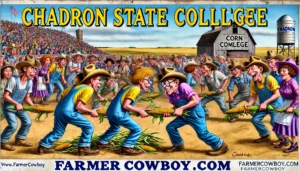
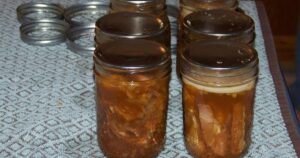
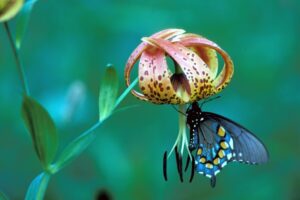
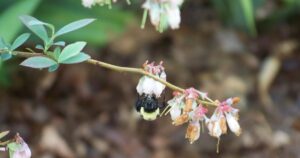



Farm Radio’s country hits are always a great way to start the day on the farm.